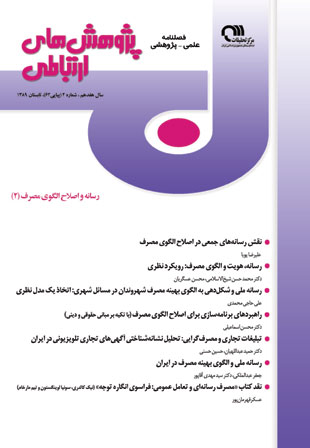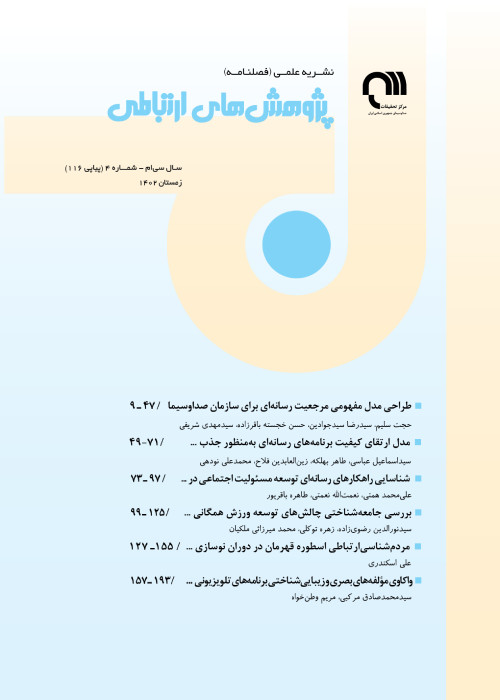فهرست مطالب

فصلنامه پژوهش های ارتباطی
پیاپی 62 (تابستان 1389)
- تاریخ انتشار: 1389/06/01
- تعداد عناوین: 7
-
-
صفحه 9مقاله حاضر با اشاره به گسترش فناوری های ارتباطی و افزایش نفوذ رسانه های جمعی در ابعاد گوناگون زندگی، بویژه نقش آنها در شکل گیری و هدایت پدیده های مهم فرهنگی و اجتماعی مانند سبک های جدید زندگی و الگوهای مصرفی، به سازوکارهای تاثیرگذاری رسانه ها بر نگرش ها و رفتارهای مخاطبان پرداخته و با تاکید بر اثرات متقابل فرهنگ و اقتصاد و معرفی الگوی مصرف به عنوان موضوعی دارای وجوه فرهنگی و اقتصادی و همچنین بیان اهمیت و ضرورت اصلاح الگوی مصرف به منزله وظیفه ای دینی و ملی، رویکردهای رسانه را در الگوسازی اقتصادی و فرهنگی و تعدیل رفتارهای اقتصادی بررسی می کند.
کلیدواژگان: الگوی مصرف، اصلاح الگوی مصرف، اقناع، رسانه های جمعی، سبک زندگی، همانندسازی -
صفحه 31هدف از پژوهش حاضر که به شیوه اسنادی صورت گرفته، مطالعه و بررسی ارتباط بین دو متغیر «رسانه» و «الگوی رفتار مصرفی کنشگران/ مخاطبان» در جامعه است. در این خصوص باید به این پرسش ها پاسخ داده شود که آیا رسانه ها صرفا بازتاب دهنده نیازهای مخاطبان خود هستند یا نقشی تعیین کننده در تولید و بازتولید این نیازها دارند؟ در مقابل، نیازهای مخاطبان چگونه محتوای رسانه را تحت تاثیر قرار می دهد؟ در مقاله حاضر، تلاش شده است ضمن نقد و بررسی رویکردهای نظری موجود در باب تاثیر رسانه بر الگوی مصرفی کنشگران/ مخاطبان، مدل تحلیلی متفاوتی بر مبنای نظریه سازه انگاری ارائه شود که بر اساس آن، رفتار مصرفی کنشگران، مبتنی بر برداشتی است که از «هویت» خود دارند. به عبارت دیگر، افراد با توجه به تعریفی که از موقعیت و هویت اجتماعی خود دارند، سبک مصرفی خاصی را متناسب با آن برمی گزینند، و در این میان، «رسانه» در تعریف این موقعیت و صورت بندی آن هویت، نقشی اساسی ایفا می کند. بنابراین در مدل ارائه شده برای تبیین رابطه «هویت»، «رسانه» و «الگوی مصرف» این سه عامل در مثلثی تعاملی قرار می گیرند که هر یک از اضلاع آن، همزمان، مقوم دو ضلع دیگر و متاثر از آنهاست.
کلیدواژگان: الگوی مصرف، رسانه، سازه انگاری، سبک زندگی، صنعت فرهنگ، وانمایی واقعیت، هویت -
صفحه 51هدف پژوهش حاضر، مطالعه نقش رسانه ملی در شکل دهی به الگوی صحیح مصرف شهروندان در مسائل شهری و در نهایت اتخاذ یک مدل نظری در این زمینه بوده است. بنابراین با توجه به رابطه متقابل رسانه ملی، مصرف و مسائل شهری، سازوکارهای تاثیرگذار بر مسائل شهری شامل ارتقای کیفیت زندگی شهری، محقق سازی شهر الکترونیک به عنوان زیرساخت اصلی دولت الکترونیک و ارتقای سرمایه اجتماعی شهروندان، مطرح شد و سپس بر چارچوب مفهومی شهروندی فرهنگی برای توسعه پایدار در مسائل شهری تاکید صورت گرفت. در بخش دیگر مقاله به رابطه متقابل رسانه، الگوی مصرف و مسائل شهری پرداخته و در نهایت الگویی جامع برای تبیین نقش رسانه ملی در شکل دهی به الگوی صحیح مصرف شهروندان در مسائل شهری ارائه شد.
بر اساس این مدل، رسانه ملی از طریق بهبود سازوکارهای تاثیرگذار بر کالبد شهری و همچنین بازنمایی نظام مند مسائل مختلف و انتقال معانی مورد نظر با استفاده از دستاوردهای نظریه های برجسته سازی، چارچوب بندی و کاشت، دستیابی به الگوی بهینه مصرف را تحقق می بخشد.
کلیدواژگان: الگوی مصرف، رسانه ملی، شهروندی فرهنگی، مسائل شهری -
صفحه 83هدف از پژوهش حاضر که به شیوه اسنادی صورت گرفته آن است که با توجه به مبانی حقوقی و دینی به بررسی «ضرورت اصلاح الگوی مصرف و نقش حکومت و رسانه در تحقق آن» بپردازد. بنابراین، پس از ارائه تحلیلی در این باره، به رسانه ها، بویژه صدا و سیمای جمهوری اسلامی ایران توصیه می کند راهبردهای هفت گانه ای را برای ایفای نقش مهم خود در نظر بگیرند. این راهبردها عبارتند از: ایجاد فرهنگ مسئولیت در برابر مصرف، نمایش آثار زیان بار مصرف زدگی، ترغیب مردم به استفاده از تولیدات داخلی، تبیین حرمت اسراف و معیارهای آن، تاکید بر احترام مضاعف به اموال عمومی، جلوگیری از ساده انگاری در مفهوم منابع و مصارف و سرانجام نظارت بر تبلیغات بازرگانی در جهت بهینه سازی فرهنگ مصرف.
کلیدواژگان: اصلاح الگوی مصرف، صدا و سیما، مطبوعات، راهبردهای تولید پیام، مدیریت درآمد و هزینه -
صفحه 107
از آنجا که عمده ترین هدف تبلیغات تلویزیونی و آگهی های تجاری، ایجاد انگیزه مصرف در مخاطبان است ، مطالعات مربوط به آگهی ها نیز بیشتر به مسائل مرتبط با مصرف و پیامدهای آن در عرصه های گوناگون زندگی معطوف شده است. بر این اساس، هدف مقاله حاضر نیز مطالعه آگهی های تجاری تلویزیون از منظر ترویج و تبلیغ مصرف گرایی است. به این منظور نمونه ای از آگهی های تجاری تلویزیونی انتخاب شده و با استفاده از رویکرد نشانه شناسانه بارت مورد تحلیل قرار گرفته است. نتایج به دست آمده نشان می دهد که آگهی های تجاری، به نحوی غیر مستقیم، سبب برانگیختن و ترویج مصرف گرایی در میان مخاطبان می شوند. بنابراین، از آنجا که احکام اسلامی، بر پرهیز از دنیاجویی و مادی گرایی تاکید دارند، تولیدکنندگان آگهی های تجاری بهتر است میان ضرورت پخش آگهی ها برای کسب درآمد از سوی شبکه های گوناگون تلویزیونی و لزوم شناساندن محصولات تجاری و خدمات به مخاطبان و نیز آموزه های اسلامی، تعادل لازم را رعایت کنند.
کلیدواژگان: آگهی های تجاری، تبلیغات، تلویزیون، مصرف، مصرف گرایی، نشانه شناسی -
صفحه 127هدف از نگارش این مقاله که با روش تحلیلی نظری و بر اساس دیدگاه های مختلف مطالعات فرهنگی و رسانه ای صورت گرفته، بررسی نقش رسانه ملی در ارائه الگوی بهینه مصرف در ایران است. ضرورت این مطالعه، به وضعیت نابهنجار مصرف و اسراف در جامعه ایران و علل و عوامل مؤثر بر آن باز می گردد که رسانه ملی در مقابل آن وظایف و مسئولیت های خطیری بر عهده دارد.
چگونگی بروز مصرف گرایی در ایران و پیامدهای آن، همچنین نقش رسانه ها بویژه رسانه ملی در تشدید یا کاهش این پدیده در جریان برنامه سازی و محتوای ارتباطات و پیام های تولید شده ساختار این مقاله را تشکیل می دهد. با توجه به چارچوب نظری، تجزیه و تحلیل یافته ها بیانگر نقش مهم رسانه در ارائه الگوی مصرف صحیح است.
بررسی رویکردهای نظری و یافته های پژوهشی بیانگر نقش مهم رسانه در ارائه الگوی مصرف صحیح است. بر این اساس، راهکارهایی مانند آشنا کردن مخاطبان با پیامدهای مصرف زدگی، انجام مطالعات پیمایشی و پژوهشی در زمینه مصرف و موضوع های مرتبط، هم اندیشی با مردم و نخبگان، ارتقای محتوای برنامه ها، توجه به سیاست های فرهنگی و رسانه ای در زمینه تعدیل مصرف ازجمله پیشنهادهای ارائه شده برای تقویت نقش رسانه در اصلاح الگوی مصرف است.
کلیدواژگان: الگوسازی، پیامدهای فرهنگی، رسانه ملی، فرهنگ، کارکردها، مصرف زدگی، نقش ها
-
Page 9Given the expansion of communicative technologies and increasing influence of mass media on individuals’ lives, particularly their role in shaping and leading main cultural and social phenomena such as new life styles and consumption patterns, the present article mainly deals with the media mechanisms influencing the audience’s attitudes and behaviors. Drawing on the interactions between culture and economy, and introducing pattern of consumption as a subject embedding cultural and economic components, as well as stressing on the significance and the necessity of observing the pattern of consumption as a religious and national duty, the article also examines media approaches to economic and cultural pattern-making and modifying individuals’ economic behaviors.
-
Page 31The present descriptive research aims to examine the relationship between the two variables of “media” and “audience/actors pattern of consumption” in the society. To this aim, the study answers a number of questions including: Do media merely reflect the audience’s needs or do they play a key role in production and reproduction of these needs? On the other hand, how do the audience’s needs affect the media content? Reviewing the existing theoretical approaches to the media impacts on the audience/actor’s pattern of consumption, the present article attempts to introduce a different analytical pattern based on the theory of constructivism in which the consumptive behavior of audience emerges based on his impression of “identity”. In other words, individuals pick up a certain consumptive style based on the notion they have of their own social status and identity. The role of media in defining the status and shaping the identity of the audience is very important. Thus, in the suggested pattern for explaining the relationship between “identity”, “media” and “pattern of consumption”, these three elements form a triangle in which each angle strengthens and influences other angles.
-
National Media (IRIB) and Shaping Citizen's Proper Consumption Pattern: Adopting a Theoretical ModelPage 51The present article aims to study the role of National Media in shaping citizen's proper pattern of consumption and to offer a theoretical model for it. Given the interfaces between National Media, consumption and urban concerns, the article introduces mechanisms affecting urban issues (including improving urban life quality, realization of an electronic city) as the Electronic Government's main foundation and source of boosting citizen's social capital. The article focuses on the conceptual framework of cultural citizenship for sustainable development in urban issues. It further explores the relationship between media, consumption pattern and urban issues and finally offers an inclusive pattern for explaining the role of National Media in shaping citizen's proper consumption pattern. Based on this model, National Media can realize an optimized consumption pattern through improving mechanisms affecting urban structure, systematic representing of different issues, and conveying intended meanings using theories of highlighting, framing and cultivation.
-
Page 83The present study, carried out using a descriptive methodology, aims to tackle “the need to improve pattern of consumption and the role of government in its realization” give the religious and law principles. Giving an analysis on this theme, the article suggests to media, particularly the Islamic Republic of Iran Broadcasting (IRIB), to take seven strategies into account while playing their significant role: developing a sense of responsibility towards consumption, displaying destructive impacts of consumptionism, encouraging individuals to consume domestic products, explaining the irreverence of extravagance and its criteria, urging the need to respect public properties, discouraging simplicity in terms of resources and consumption, and finally, monitoring commercials in terms of optimizing consumption culture.
-
Page 107
Since the main aim of TV commercials and ads is to trigger the audience consumptive motivation, much of the research on the subject has focused on issues dealing with consumption and its impacts on different aspects of life. Taking this into account, the present article aims to study TV commercials in terms of promoting and advertising consumptionism. The sample of study consists of a number of TV commercials which were analyzed using Bart Semiotic Approach. The findings show that commercials prompt and promote consumptionism among the audience indirectly. Thus, since the Islamic rules urge avoiding materialism, the producers of commercials would better make balance between the Islamic teachings and commercials as a source of income for different TV channels and the need to introduce commercial products and services to the audience.
-
Page 127The present article aims to examine the role of National Media in presenting the pattern of optimized consumption in Iran using a theoretical-analytical methodology based on different cultural and media studies. The research is of paramount significance due to the abnormal state of consumption and extravagance in the Iranian society and the reasons behind this anomaly with regard to the responsibility of the National Media.The process in which consumptionism emerged in Iran and its subsequent implications, as well as the role of media, particularly the National Media, in the rise or fall of this trend in the stream of programming and creating media content and messages, form the basis of the present article. Given the theoretical framework used in this research, analysis of findings is indicative of the significant role of media in offering a proper pattern of consumption.Introducing to audience the impacts of consumptionism, launching surveys and studies on consumption and the related issues, consulting people and elites, increasing the quality of programs content, paying attention to the media and cultural policies in terms of modifying consumption are among the suggestions the article offers for strengthening the role of media in improving the pattern of consumption.


